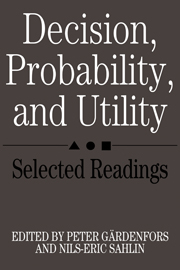Book contents
- Frontmatter
- Contents
- List of contributors
- Preface
- 1 Introduction: Bayesian decision theory – foundations and problems
- Part I Foundations of Bayesian decision theory
- Part II Conceptualization of probability and utility
- Part III Questionable rules of rationality
- Part IV Unreliable probabilities
- Part V Causal decision theory
- References
- Name index
- Subject index
Part III - Questionable rules of rationality
Published online by Cambridge University Press: 05 June 2012
- Frontmatter
- Contents
- List of contributors
- Preface
- 1 Introduction: Bayesian decision theory – foundations and problems
- Part I Foundations of Bayesian decision theory
- Part II Conceptualization of probability and utility
- Part III Questionable rules of rationality
- Part IV Unreliable probabilities
- Part V Causal decision theory
- References
- Name index
- Subject index
Summary
This part of the volume presents some of the criticisms that have been leveled against the axioms used in deriving the MEU principle. In particular Savage's sure-thing principle will be in focus.
First, Savage presents the Allais paradox (discussed on p. 11 in the introduction to this volume). He says that when this decision problem was first presented to him, he immediately expressed the same pattern of preferences as most people do and thereby he violated the surething principle. But he claims that after thorough deliberation he realizes that one of his preferences was an error which he then wanted to correct, with the result that he no longer violates the sure-thing principle.
But perhaps Savage puts the cart before the horse by using the MEU principle as a normative motivation underlying his judgment of error. One is then faced with the question of why Savage's axioms, and in particular the sure-thing principle, are normatively valid. McClennen investigates four different lines of argument that have been used to defend the normative validity of the sure-thing principle. The results of his investigation are all negative and he concludes that “the sure-thing cornerstone to the modern theory of utility and subjective probability is less secure than one would like” (p. 168 in this volume).
Kahneman and Tversky present a critique of the MEU principle as a descriptive model of decision making under risk.
- Type
- Chapter
- Information
- Decision, Probability and UtilitySelected Readings, pp. 159 - 162Publisher: Cambridge University PressPrint publication year: 1988



